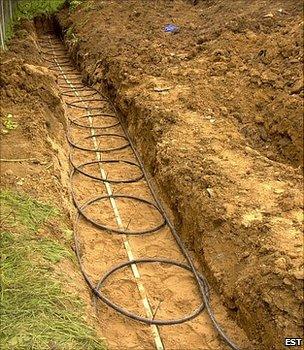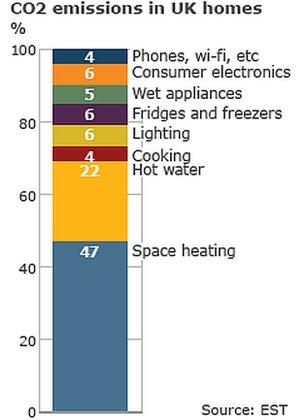Heat pumps 'need tighter regulations'
- Published

A well-designed heat pump system can deliver carbon and financial savings, the report suggests
Domestic heat pumps need to be subject to tighter regulations in order for them to deliver widespread energy savings, a report has concluded.
The study called for better standards to ensure the technology consistently delivered energy savings.
The devices transfer heat from the air or ground outside into a building, cutting the use of boilers or heaters.
The study, described as the most comprehensive of its kind, was compiled by the Energy Saving Trust (EST).
The EST said it decided to carry out the study, assessing data from 83 sites across the UK, because there was a general lack of data on the performance of the devices.
"We have a responsibility to make sure that customers' investments are spent on measures that lead to the greatest potential to save carbon and reduce energy bills," said Simon Green, the EST's head of business development.
The trial examined 54 ground source pumps and 29 air source pumps over a 12-month period, monitoring the devices' technical performance as well as the customers' experiences operating the technology.
"It does demonstrate that the potential carbon savings from the technology are actually very good in the UK," Mr Green told BBC News.
Potential savings
He added that the properties that were likely to most benefit from the technology were homes that were not connected to the national gas network, and were currently using either oil or electricity heating systems.

He said well-designed systems can operate effectively in the UK, delivering in excess of three units of heat for every unit of electricity used to pump the heat in and around the property.
The report estimated that if all "off-gas" properties in the UK were fitted with a heat pump, it would save 10m tonnes of CO2 each year, and cut annual bills by as much as £1.5bn.
Mr Green also said that prospective buildings should be well insulated to reduce the "heat load", the amount of heat the system needed to deliver in order to warm the property.
However, he did add that a number of the sites included in the study did not perform well.
"Indeed, there are probably a whole range of reasons for this," he explained.
"Unlike conventional boilers, that you can retrofit relatively easily, heat pumps are very, very sensitive - it is imperative they are designed to heat the relative load; if they are undersized or oversized, then the efficiencies are significantly reduced."
The EST report, which was compiled in association with the Open University, concluded that the simplest designs often delivered the highest efficiencies, but it did say that further studies were required on an installation-by-installation basis in order to learn more about what needs to be done in the future.
The Trust is set to head a working group, including industry representatives and government officials, that will make recommendations on how training and installation standard can be improved.
"Heat pumps will be a crucial component of our low-carbon future, provided they perform well," said David Mackay, the Department of Energy and Climate Change's chief scientific adviser.
"It is therefore essential to conduct trials to establish best practice and perfect this technology for use in buildings throughout the UK."
Almost half of the CO2 from homes in the UK are a result of space heating, while heating water accounts for more than a fifth of domestic emissions.
Simon Green said there were a number of differences between the European and UK heat pump markets.
"In Scandinavian countries, just one company will come and excavate the bore-hole, do the design, commissioning and plumbing - the whole thing," he observed.
"In the UK, because it is an emerging market, the industry is much more fragmented so you will have a variety of contractors involved and this can raise a few issues, such as not getting a co-ordinated approach."
Roger Nordman from the Swedish SP Technical Institute, who reviewed the EST trials, said domestic heat pumps were already well established in Sweden.
"Some of the best performing sites in this project compared favourably with what has been monitored in other European countries," he explained.
But, he added: "The major difference is that the UK has particularly old and inefficient housing stock.
"The market is also more mature in the rest of Europe and installers have much more experience in installing the technology."
- Published23 August 2010